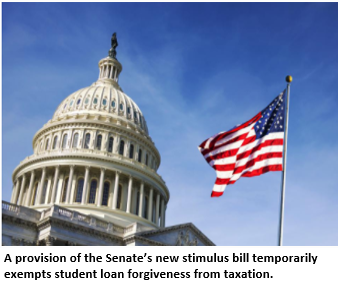Good News For Student Loans
As regular readers know, I opposed President Biden’s latest $1.9 trillion stimulus plan which became law last week. In my view (and many others), it is way too big; 90% of it is for liberal pork barrel spending; and the economy is already on-track for its strongest growth in decades, without the giant stimulus goose.
However, upon reading in more detail what all is included in the $1.9 trillion stimulus plan, I ran across one small provision I actually agree with. This provision has to do with how student loans are repaid and provides a sensible tax break for former students who are trying to repay their college debt.
As you may know, there are several formal programs through which most students can structure their repayment plans, each of which allows student borrowers to base the amount of their payments on how much income they earn and how many dependents they have. These various options are collectively referred to as “income-driven repayment plans.”
The plan sponsors work with former students to determine the appropriate monthly repayment amount, which is restructured periodically as their income changes. The student agrees to make these payments, typically for 20-25 years, after which time the remaining loan balance is forgiven in full.
For millions of student borrowers, an income-driven repayment plan is the only affordable option to service their college debt. But it comes with a significant catch!
As an example, let’s say you have $100,000 in student debt and you agree to pay $210 a month for the next 20 years (and for purpose of this illustration, let’s assume your payment never changes and there’s no interest on the debt, which there is). At the end of 20 years, you would have paid in $50,400, which means the remaining balance of $49,600 would be eligible to be forgiven in full.
Now, here’s the BIG catch: Per current IRS tax code, that $49,600 is treated as immediate taxable income. Let’s next assume you have an effective income tax rate of 30%; in that case, you immediately owe the IRS almost $15,000.
Unfortunately, most student borrowers (including many of their parents) are NOT aware of these tax consequences when they enter into the loan repayment agreements. So, most are in a real pickle when they finish paying off the agreed to amount and suddenly learn they owe income tax on the forgiven portion.
Now let’s get to how the latest Biden stimulus addressed this problem. A provision in the $1.9 trillion Biden package stipulated that going forward these forgiven balances would not be treated as taxable income. I’ll be the first to admit this is not an ideal solution since it costs the government tax revenues. And some, I’m sure, will argue that these student loan borrowers should not be given such a nice tax break.
But let’s face it: Former student borrowers owe a record $1.6 trillion in outstanding loans, which arguably will never be fully repaid or even close. But at least many are trying by entering into these income-driven repayment plans.
Unfortunately, many student borrowers are trying to repay their loans, and looking forward to the forgiveness of the remaining balances at the end – without knowing the tax liability they’ll face when the balance is forgiven.
While not a perfect solution by any means, I support this provision in the latest huge Biden stimulus package which passed last week. As for the other provisions in the Biden stimulus bill, I still oppose them on the grounds they were clearly unnecessary.
I wanted to bring this to your attention because I believe most student borrowers are unaware of these tax consequences when they take out their loans while in college or when they enter into these various direct-income repayment plans after graduation.
Additionally, I want parents of college-age students to have this information when they advise their kids about taking out student loans and, most importantly, because many parents co-sign as guarantors of their kids student loans. In such cases, the lenders will come after the parents for repayment of those loans AND the IRS for income tax on any forgiven balances.
I must admit I didn’t know about the tax implications for forgiven college loan debt until now. I had student loans when I went to college in the early-to-mid 1970s, in addition to working mostly fulltime. Yet there were no such forgiveness issues back then, and the government was not in charge of the student loan process, as is the case since President Obama nationalized it.
I borrowed my money to go to college and graduate school from banks, so getting that debt forgiven was not an option. And defaulting on those loans was never a consideration in any event, not to mention the crippling effect it would have had on my credit rating.
Obviously, many of my clients and readers have grown kids who already graduated college, often years ago. This information may not help them, but I encourage you to share it with them: 1) because they may not be aware; and 2) so they can share it with their children.
In closing, long-time clients and readers know I am normally not in favor of government giveaways. But in this case, I think I can make an exception, especially since only 47% of student loan debtors are paying anything toward their student loans, according to savingforcollege.com. Maybe this will help.




